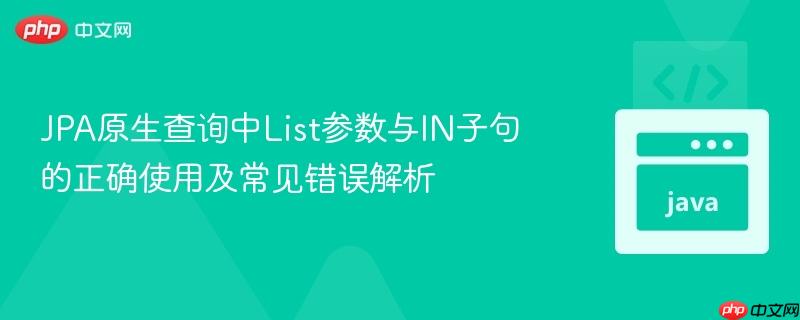
在使用spring data jpa进行数据库操作时,我们经常需要执行复杂的查询,此时原生查询(native query)便显得尤为重要。当查询条件涉及到in子句,并且需要传入一个列表(list)作为参数时,jpa/hibernate提供了一种便捷的机制来处理。
其核心原理是:当你在原生查询中定义一个命名参数(例如:paramName),并将其与一个List类型的Java方法参数通过@Param注解关联时,JPA/Hibernate会在内部自动将这个列表展开。例如,如果List中包含三个元素['a', 'b', 'c'],那么IN (:paramName)在实际执行的SQL中会被转换为IN ('a', 'b', 'c')。这种自动展开极大地简化了开发工作,避免了手动拼接SQL字符串的复杂性和潜在的SQL注入风险。
尽管JPA的参数绑定机制强大,但在实践中,开发者常会遇到org.hibernate.QueryException: Named parameter not bound这样的错误。这个错误通常发生在以下场景:
你定义了一个原生查询,并尝试通过@Param注解绑定一个列表参数,但@Param注解的value属性与SQL查询中的命名参数不一致。
例如,考虑以下一个试图查询包含特定食材的个人食谱的JPA Repository方法:
// 错误示例:@Param值与查询参数名不匹配
@Query(value = "select personal_recipes.name, personal_recipes.type, personal_recipes.comments, " +
"personal_recipes.instructions, personal_recipes.rating, ingredients.name, ingredients.quantity " +
"from personal_recipes " +
"inner join ingredients on personal_recipes.name = ingredients.recipe_name " +
"where (ingredients.name::citext in (:ingredientFilter))" , nativeQuery = true)
List<PersonalRecipesEntity> getPersonalRecipesByIngredient(@Param(value = "ingredient") List<String> ingredientFilter);在这个例子中,SQL查询中使用的命名参数是:ingredientFilter,但在Java方法参数ingredientFilter上,@Param注解的value属性被错误地指定为"ingredient"。由于@Param注解的value属性是JPA用来匹配Java方法参数与SQL查询中命名参数的唯一标识,这种不匹配会导致Hibernate无法找到名为ingredientFilter的绑定参数,从而抛出Named parameter not bound : ingredientFilter异常。
解决Named parameter not bound错误的关键在于确保@Param注解的value属性与原生SQL查询中的命名参数完全一致。
以下是上述错误示例的正确修正方式:
// 正确示例:@Param值与查询参数名匹配
@Query(value = "select personal_recipes.name, personal_recipes.type, personal_recipes.comments, " +
"personal_recipes.instructions, personal_recipes.rating, ingredients.name, ingredients.quantity " +
"from personal_recipes " +
"inner join ingredients on personal_recipes.name = ingredients.recipe_name " +
"where (ingredients.name::citext in (:ingredientFilter))" , nativeQuery = true)
List<PersonalRecipesEntity> getPersonalRecipesByIngredient(@Param(value = "ingredientFilter") List<String> ingredientFilter);通过将@Param(value = "ingredient")修改为@Param(value = "ingredientFilter"),我们确保了Java方法参数ingredientFilter能够正确地绑定到SQL查询中的:ingredientFilter命名参数。
另一个来自实际案例的正确示例如下,它同样展示了参数名称匹配的重要性:
@Query(value = "select q.* from sde.pqrs q where q.fecha_radicado between :fechaInicial and :fechaFinal and q.radicado in (:radicados)", nativeQuery = true)
List<Pqrs> consultaRadicadoDeVisita(@Param("fechaInicial") java.sql.Timestamp fechaInicial,
@Param("fechaFinal") java.sql.Timestamp fechaFinal,
@Param(value = "radicados") List<String> radicados);在这个例子中,@Param("fechaInicial")对应:fechaInicial,@Param("fechaFinal")对应:fechaFinal,以及@Param(value = "radicados")对应:radicados,所有参数都实现了精确匹配,因此查询能够正常执行。
在上述查询中,我们使用了PostgreSQL特有的::citext类型转换。citext是一个PostgreSQL扩展,用于实现不区分大小写的文本比较。例如,ingredients.name::citext in (:ingredientFilter)表示将ingredients.name字段转换为citext类型后再进行IN子句的比较,从而实现大小写不敏感的搜索。
需要强调的是,::citext这种数据库特定的类型转换语法,与JPA的参数绑定机制是正交的。只要参数绑定本身是正确的(即@Param注解与SQL中的命名参数匹配),citext的使用不会影响参数的绑定过程。它仅仅是SQL查询逻辑的一部分,由数据库负责解析和执行。
在JPA原生查询中使用List类型参数绑定IN子句时,最常见的错误是Named parameter not bound,其根本原因在于@Param注解的value属性与SQL查询中的命名参数不匹配。通过确保这两个名称完全一致,即可有效解决此问题。同时,利用nativeQuery = true可以灵活运用数据库的特定功能,如PostgreSQL的citext,以满足更复杂的查询需求。遵循这些最佳实践,将有助于编写更健壮、更高效的JPA数据访问层代码。
以上就是JPA原生查询中List参数与IN子句的正确使用及常见错误解析的详细内容,更多请关注php中文网其它相关文章!

每个人都需要一台速度更快、更稳定的 PC。随着时间的推移,垃圾文件、旧注册表数据和不必要的后台进程会占用资源并降低性能。幸运的是,许多工具可以让 Windows 保持平稳运行。

Copyright 2014-2025 https://www.php.cn/ All Rights Reserved | php.cn | 湘ICP备2023035733号